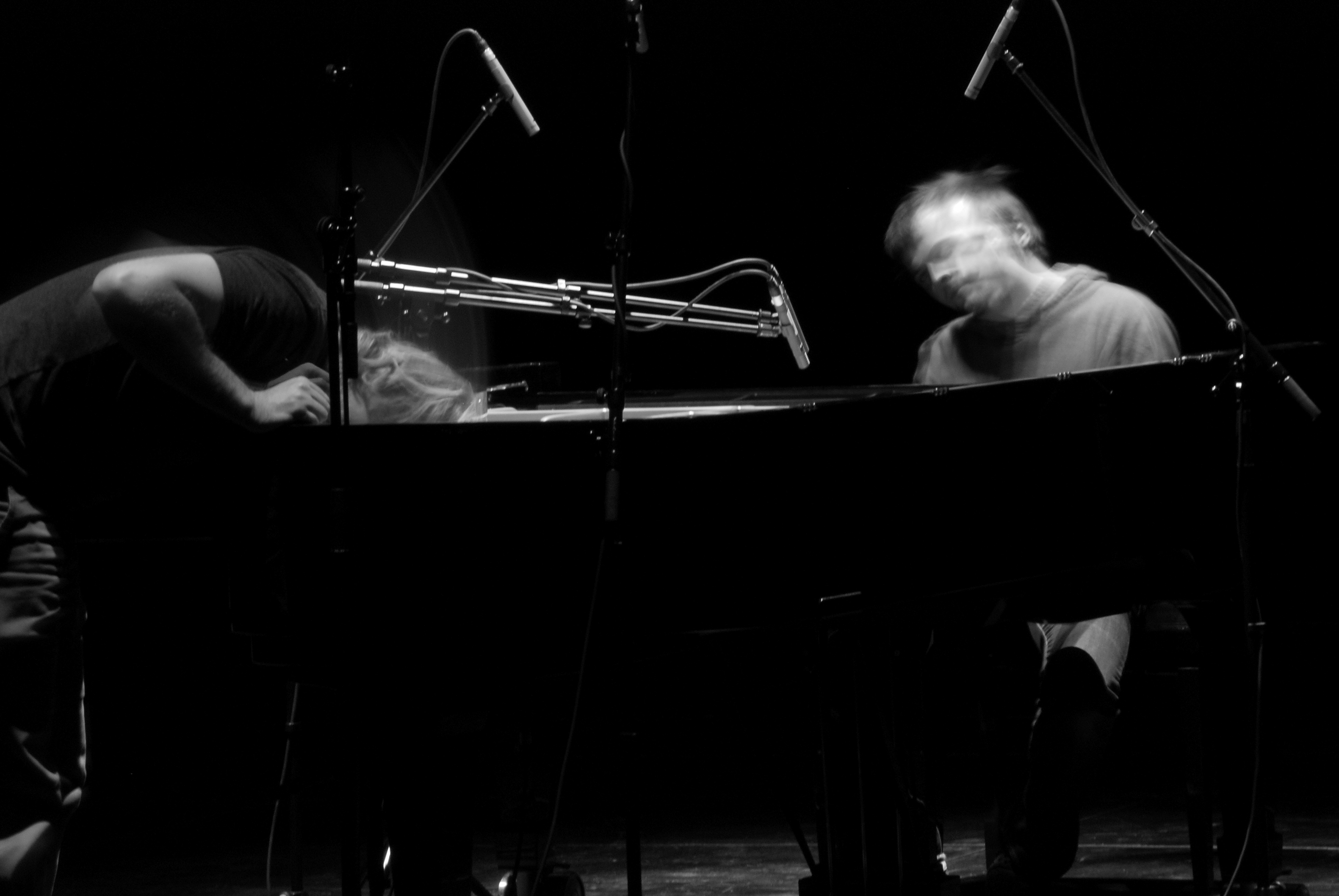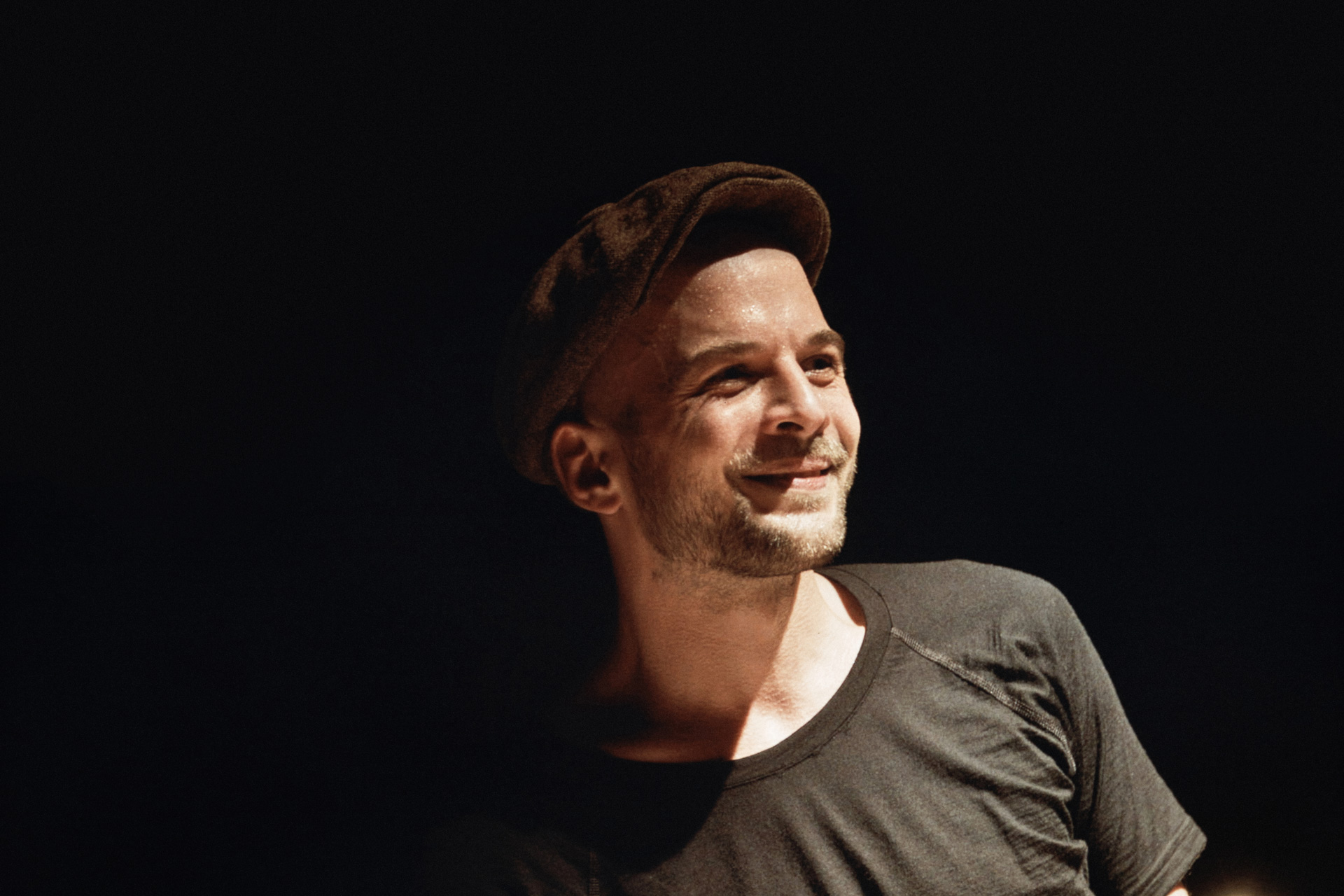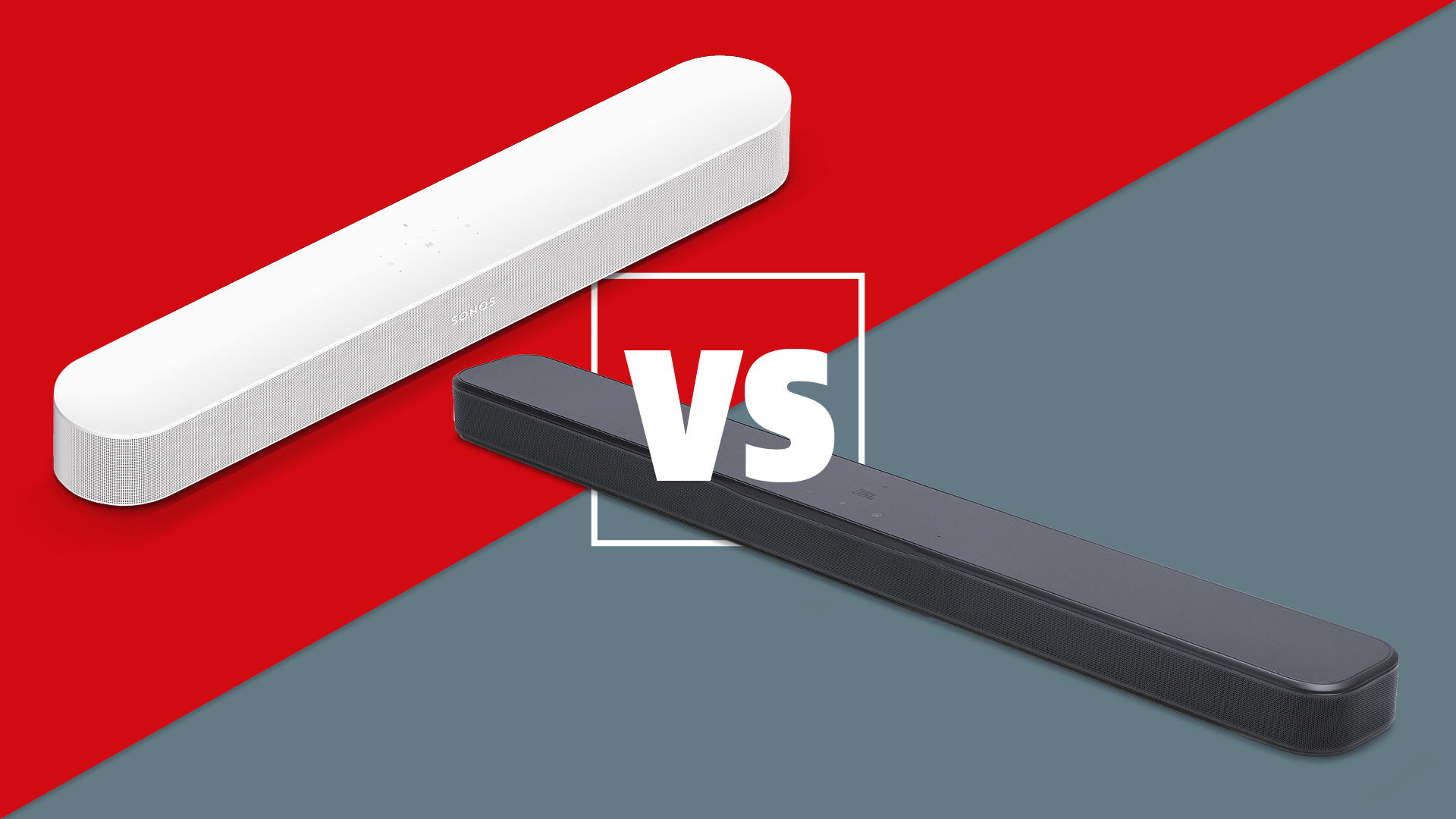Nils Frahm: "When I like something I want to know why; I want to understand the principle"
We celebrate Piano Day 2021 with the composer who started it all

"I suppose you can't have true respect for something unless you're willing to challenge it," we posit to Nils Frahm. "Exactly," he replies. "Exactly."
It feels good to have Frahm agree with you. Not only because his music is as much part of our homes – and the What Hi-Fi? test rooms – as the light fixtures and soft furnishings. It feels good to have Frahm agree with you because he comes across as an expert on whichever topic he is speaking about in that moment.
He even makes his own soap. Because that devilish streak of tinkering with his instrument, which we celebrate today on Piano Day, is just symptom of a wider curiosity this exquisite composer applies to every part of his life. Whether or not he is an expert is almost moot, as that infectious interest in everything travels down the phone line to us.
Even Piano Day cannot be taken at face value when Frahm, the very man who appointed it as the 88th day of the year, discusses the instrument's more menacing symbolism.
Nonetheless, it is clear that there is a lot of love in this relationship. To celebrate this year Frahm has today released Graz, the first album he ever recorded for Erased Tapes.
This grand piano recording has taken 12 years to surface – though certain pieces you might recognise from his live performances – and captures a more youthful musician nearer the start of a career, and nearer the beginning of this mischievously respectful relationship with his instrument that we hope is nowhere near its end.
Over half an hour, we managed to talk with Frahm about Graz, recording the piano and a heavily customised hi-fi set-up. Not that we'd have put him through it, but we could have spoken for hours upon hours longer.
The latest hi-fi, home cinema and tech news, reviews, buying advice and deals, direct to your inbox.
An emotional reaction

What Hi-Fi?: We should probably start by congratulating you on getting Erased Tapes to release your debut album, at last. We've listened to it a few times and it's got that real sort of transformational quality that your music has; it goes through that metamorphosis depending on what time of day or when in the year you hear it. Is the album as recorded in 2009?
Nils Frahm: It was recorded in a place where there was a special setup. It was basically a big studio that has variable acoustics, realised through microphones in the room and speakers where there's a custom-made reverb algorithm, which basically takes the sound from various points – I think it has about 16 microphones and 64 speakers – and you can change the the parameters of the ambience through this.
So the shortest reverb is maybe 1.8 seconds, then you can turn on the engine and it will generate a reverb which you would like to hear in that room. It can be quite impressive; when you close your eyes and you play, and somebody tweaks with the parameters of the settings, you basically travel through space. Basically, while I was improvising, my colleague was turning some knobs and dials from this reverb engine, and that was inspiring me to play in a different way maybe.
WHF?: Reverb, and natural reverb especially, has been a huge part of your playing; it was in All Melody you used a dry well that you had found on holiday. How important for a piano recording is it to hear the space that it's been recorded in?
NF: I think the room for acoustic instruments plays a big role, because essentially the room makes stuff louder and sound more immersive. With reflections and some sort of ambience an acoustic instrument sounds like it's floating around you. Coming from various points, it becomes more three-dimensional and big sounding.
This is why a piano or a symphony orchestra sounds much better in a room over being played outside; I still don't understand why some festivals curate classical concerts outside, because strings or the whole classical ensemble without the natural reverb for me doesn't blend. You can't blend the elements together without ambience. So I think the same for the piano: you have a lot of different sounds and notes and things on a piano. With the acoustics you put all of this together in one concept, almost as if you would dress a person from tip to toe.
WHF?: The performance is obviously key, and a recording lives or dies by it, but what other things are important to get right when recording the piano?
NF: The performance. Because when the performance is well put and the balance between the notes and the balance in the voicing, the loudness of each finger, is put right then basically the recording is quite stable. And if you have an unstable performance you have to really work much more with the mixing, or focusing on the microphone position, or choice of reverbs and processing to get the performance organised. Basically that's the case for every musical performance. When the performance has some integrity and is put well, then as a recording engineer or as a person listening back at home, it's an easy task to transport that wonderful moment.
Because sound in the end is decoded in our brains into an emotional reaction somehow – I don't know how that works – but I would say that if you hear something that doesn't really get you emotionally, you will analyse more technically. And if something just haunts you or something strikes you, and you don't know why, you will not really ask so many questions.
It's like a phenomenon. When I listen to Chet Baker records and I hear the voice then hear the piano, the piano sounds kind of bad, honestly. But together with the voice, the quality of the piano and the quality of the voice becomes something that's hard to explain why it works. I think it's because Chet really just sings so beautifully, and the piano just really plays wonderfully, and that gives you so much freedom as a producer to put these elements wherever you want. When you play really good you can make that element 6dB louder or 6dB quieter: it will still be amazing. If you have a bad arrangement or a bad take, you will fiddle with the volume to fit it in, because it will never be right.
A rebellious angle

WHF?: You have what we would describe as an almost two-way relationship with the piano, in that it feels like it's rewarding you for the care you put into its tone and its timbre. What makes it such a special instrument?
NF: I think all instruments are pretty special. The piano is so special because I think it has had such a big success in the history of music. Ever since it was invented it played a huge role in the creation of music, especially in the Western world. Not so much in other places in the world. The piano is also testimonial to an industrialised society, a Western capitalist industrialised society, because it's very difficult to make unique heavy machinery; you need vast skill sets and machines to make a piano. And you need a lot of money!
And so the piano is a symbol for power as well. These are all components I am also aware of. I try to have the awareness to treat the piano with a certain respect, but also show a sense of humour. Because when you take the piano too seriously, you also take the society we live in too seriously. You might get more interesting results from the piano if you treat it with respect but also with a rebellious angle, because there are many things I don't agree with. I don't think the West created a fair world, or a better place for everybody. So if the piano is a statue or symbol for all of this, then whatever the critique is towards a society or towards our philosophy, or our culture, the critique also addresses the piano.
So that's why I respect it but I also disrespect it, in terms of changing its sounds or putting things inside, or doing wrong things maybe with it. Because I think the piano shouldn't rule us, we should rule the piano; in as much as the values of a capitalist society or a white supremacist society shouldn't rule us, we should rule the society. So it's very philosophically put, but the piano is a symbol also for all the things I don't agree with, and it creates an interesting angle for me to approach this special instrument.
WHF?: You can't have true respect for something unless you're willing to challenge it.
NF: Exactly, exactly.
WHF?: As well as experimenting with your instrument, on Spaces in particular you have a lot of different ways of recording; it's almost a collection of field recordings. Is using things such as reel-to-reel an experiment, or is there a particular sound to each medium that you really like and want to capture?
NF: For me it's a little bit like with photography: the best camera is always the one you have with you. You can say the best recorder is always the one you can just work with in the moment, and is reliable and records the music. And true, they sound all a little bit different, but when I choose to record something on a cassette tape it probably reflects the approach of that session. I probably just don't have real good equipment available and I take maybe just a really cheap USB junk sound card rather than my really high quality converter that I only have in one place.
I like to record on really interesting broadcasting master recorders. I like quality from all eras, and when I buy a cassette deck on eBay for 200 bucks, it's maybe the Marantz PMD master recorder that was built for broadcasting documentaries. It has a certain quality: it will always turn on, it's made out of metal, you can listen to the record head and you can definitely check what you're recording. I really go with whatever sound comes out of it, if the machine is so well designed.
I'm a big fan of the Nagra tape recorder as well, or I record a lot on portable to track field recorders, made for film sounds. For me – tape, digital, analogue – whatever gets the job done and I feel happy with is my colour of choice. Because I know that whatever I do there is so much flexibility to treat material further in the mixing processes, and have more decisions. Of course, when I put something on tape I will never make it sound like a really good modern recording, but there's still so many places that I could go with it that I just trust what will come out.
WHF?: It comes back to the performance being key; but if you set a certain recorder up do you think that affects the way you play?
NF: I don't try to make the recorder a big inspiration or compositional element. I would rather record in a way that I can play loud notes without distortion, and if I play very quiet I will record in a way that I don't just hear noise. But obviously the piano is a very dynamic instrument: if you want to get a good recording done, before you start playing you should think ‘is this a loud piece or a quiet piece?’.
I always turn the gain on the mic preamps to an according position, because the piano has over 90dB of usable dynamics. If I play super quiet and I have to crank the preamps up otherwise I will record almost nothing, and if I know I’ll play a loud piece or dynamic piece I have to turn the amps down knowing the quietest elements will not otherwise sound as good. So obviously I take this into account [but it doesn’t change the way I play].
WHF?: Do you have a list of favourite piano recordings that you go back to again and again?
NF: I think my favourite piano record, that I have gone back to for years, is one that doesn't really sound like my style of recording. It's actually the opposite: it's a very far, distant sound. It's a recording called Bagatellen und Serenaden by Valentin Silvestrov. He is a Ukrainian composer living in Kiev; I think it's like nobody recorded the grand piano in such a loving way as ECM has done. Another mind-blowing recording from ECM is Der Bote by Alexei Lubimov. And there's one piece [on that record], In the Landscape by John Cage, and that piece is just sounding unreal.
But again most of that is how the piano was treated and prepared by the piano technicians prior to the session. They really make the sound of the piano, these people, the piano tuners. They don't tune the piano, they touch it in every possible spot; they put oil here, they sand down the hammers, they put needles inside the hammers to see whether the density should be different. So each note gets basically custom tuned, and so the whole piano becomes one thing that sounds like an instrument, which inspires the player. Because a piano that doesn't inspire the player will not lead to a good take.
So all becomes like one beautiful thing: the room, the acoustics, how the piano is set up, who is the piano builder and the player, the performance. All that composition. And out of a thousand piano recordings, there are some that are just reaching far beyond what I thought was possible. That always sets imagined horizons, for me to remember: ‘wait, maybe we'll get something else out of that wooden box, something more engaging than what we've heard.’
Principles and physics

WHF?: We want to talk to you about not just what you listen to, but how you listen at home. Do you have a mix of sources, amplifiers and things?
NF: At home I listen strictly to vinyl at the moment, just because I don't need flexibility. I have the studio where I can listen to digital files. At home I just play records. I have a good pick up on a customised [Technics SL-1200] MK2. I just love that record player; I actually like how it looks also, people hate the Technics now but I still have mine and I'm very happy with it.
And that goes through a phono stage. I forgot the name: it's a custom box from Sweden by a guy who put all the equaliser curves of all the different pressing plants – the Philips and Columbia and whatever – because I have a lot of original Columbia records for my US tours. I collect some original jazz records. And so I can just set the equaliser settings, because I realise that some of the records sound really much different when I change the EQ – and that makes sense when you know the history of that.
Then out of the phone stage I go into a... Jesus Christ, I'm so bad at names; I just bought this thing.. it's an Air Tight, used 34-watt tube amp. I go straight into that and I need the boost to drive my 15 Ohm Klangfilm speakers. I made some custom wood panels for it so it's not a closed chassis, it's an open-baffle speaker. They have a coaxial driver with a tweeter in the centre, which is similar to the system I use in the studio, but it's from the 1940s or something. And I made my own frequency divider for this with just an old British condenser, which sounds fantastic and takes the low out of the tweeter.
It's very rough but it gives me such a good overall sound and tone. It isn't very good with very low bass, and it's not a fast speaker, but when you play resonant, atmospheric music like piano or jazz or old records especially, it sounds almost like people are in your room playing. It's absolutely mind-blowing. Obviously it's not a reference system, but it's a very good sound system.
WHF?: It sounds a lot like the way you approach the piano, tinkering and tailoring to make it fit your own taste. Is that something you’ve always been interested in, on the listening side?
NF: Yes, every aspect in life for me is similar. I don't want to buy brands, I think it's boring when you just go ‘I like this brand and I like that brand’. I want to go beyond and when I like something I want to know why; I want to understand the principle, and often it's not the magic of some brand. I mean, people think they should buy Bose speakers – I don't want to bash Bose, they just don't do the equipment I like – but if people trust the name, they think whatever they do will work.
Even if you listen to people with the everyday stuff, they say ‘oh, I have to buy the soap from this brand’ and ‘you have to buy the soap from that brand'. And I am always like, well let's take that soap let's look at the back: so it's this, it's this, it's this... and then I go back and try to find the basic components. Usually it gets much easier without the additives and the weird colouring stuff, and it's for the same for me with instruments or speakers.
I want to know, why do I like this? For example, why do I like coaxial speakers? The principal for me is much more important than the brand. All the forums that try to figure out how to make stuff sound good, they discuss brands and models; but people don't really discuss physics, and they don't really discuss principles, and types of signal flow. So there's little knowledge about Class A, B, C, D – and so people try to remember what they should buy, and they think, ‘so I heard Class A sounds the best, so I need class A’. But often you don't need class A. For me it's always about looking under the bonnet.
WHF?: It’s testament to your creative mind that everything is an interaction rather than a consumable for you. Is it a similar tweaked set-up when you’re touring and on the move?
NF: No, my life is simple: when I don't have a sound system that I like, I don't really listen to music. I also need time away from sounds and away from music, nobody wants to listen to music 24/7. So if I'm not in the studio or not at home, I just stop listening to music. And if I'm in the car, I go with whatever sound system is in there. I would never spend money on that: it's just a car. Maybe I listen to NPR or something like that, and it helps me also to listen to music on just a very average sound system, just for double-checking mixes.
So yeah, I'm not a picky type. Like I said, I value good-sounding records over a good-sounding sound system. Because I learnt a lot of people who are crazy about good speakers, they start buying CDs that are only made for good speakers, where the music was recorded through golden cables or whatever. And the musicians are not so good, but their sound recording is really good, and so they listen to reference where the music is not so interesting. For me, that is the point where I'm just getting lost, because the sound system is just there to play music from talented people with a message. Sometimes these moments are recorded great, and then if they're recorded great I can also listen to that on a shitty sound system where it will cut through.
My first Radiohead experience was like that. I listened to a €100 or whatever, portable, shit CD player back in the day in the late 90s, designed for a children's room. And I sat and I played Amnesiac, and it sounded huge. It sounded absolutely insane, it sounded completely different to all the other records I had, and I could never really get sound out of that box. I was at that point more interested in bypassing the quality of what people have as a hi-fi, and try to make music which transforms the speaker, whatever quality it is, into to what the composer or the artist wants from it.
I know examples of records that will sound good on every sound system I know, and that's not 100 per cent what is important but it's very interesting to learn about this. Especially when people don't make music and they just buy equipment to play back, and they're not so familiar with how music is made. They need to know that when something doesn't really sound right in that room ,or something doesn't really sound right in that moment, it's mostly a problem with the producer. It should not be the problem of the consumer to help whatever didn't work in the recording or production stage. So whenever we want to listen to good music, we just have to find the good music. It’s very easy and you don't need to spend too much money on on anything
WHF?: Those recordings you know will sound good on any system, what are they for you?
NF: Basically anything Miles Davis recorded In the 50s and 60s, especially Kind of Blue and the soundtrack he did for the French film, Ascenseur pour l'échafaud. That will transform your iPhone into to a huge soundstage. And obviously the Chet Baker example is is the most convincing for me, because when you put Chet Baker on your iPhone and you put your iPhone into a Pringles box, it will also almost sound as good as if you listened on thousand euro speakers. Maybe just 90 as opposed to 100 per cent. It's a rough statement to make, but people probably get the point.
MORE:
